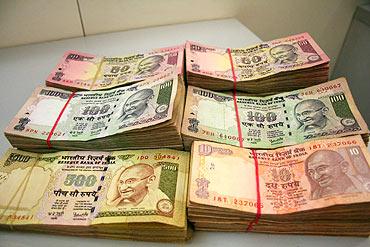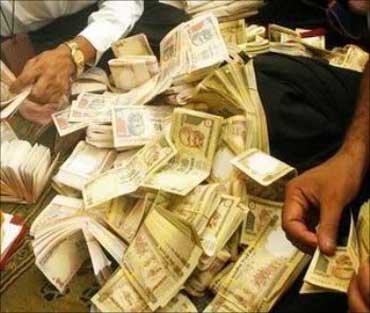
The Central Vigilance Commission has come out with a stunning report on the 'public-private partnership' model of the nexus between corporates, politicians and bureaucrats to perpetrate large-scale corruption.
In its latest monthly newsletter on its official website, the CVC has highlighted a recent report by Transparency International India documenting the unholy partnership of the government and the private sector in graft in mining, oil and power sectors.
In scathing comments, the report says, "The private sector is no more a victim of corruption in India. Instead, it is instrumental and hand-in-glove with public officers. Collusive corruption, where officials from public sector undertakings join hands with the private sector, is greatly present in the Indian business environment, particularly in the power, mining and oil sectors."
Reportage: A correspondent in Delhi
Click on NEXT for more...

TII, accredited with the Berlin-based Transparency International, a global anti-corruption civil society body, prepared the report to assess the impact of the government departments adopting the organisation's Integrity Pact to curb corruption in procurements.
It wants the private sector too to embrace IP and urges the government to bring "a strong deterrent tool (law) to curb corruption in the private sector."
"They pay bribes to (counterparts) from other private companies to get their work done," the report noted, pointing out that bribery among the officials of private companies is rampant.
The CVC says it is not that the Centre has not tried to bring the private sector within the ambit of the anti-corruption framework. There are sharp differences among states on the issue of the anti-graft Lokpal, but almost all of them are on the same page with the Centre on keeping the private sector under the lens in the fight against corruption, the minister of state for personnel had said in a written reply to a question in Parliament earlier this week.
Click on NEXT for more...

Since the prime minister floated the idea of making the private sector accountable for corruption at a function of the Central Bureau of Investigation five months ago, 22 states and union territories have sent in their replies. Only Himachal Pradesh has opposed the proposal, he said.
Even the Opposition-ruled states of Gujarat, Karnataka, Chhattisgarh, Jharkhand and Tamil Nadu as also the Trinamool-ruled West Bengal concurred with the proposal to amend the Indian Penal Code to make bribery in private sector an offence, attracting punishment at par with that meted out to the corrupt government officials.
Other states which agree to such a move include Jammu and Kashmir, Goa, Maharashtra, Rajasthan, Punjab, Kerala, Haryana and Delhi. J&K Chief Minister Omar Abdullah hailed the proposed amendment as a step forward.
The proposed amendment in the IPC will make bribes exchanged between private persons a criminal offence. If a private company official pays another company's official a bribe in cash or kind for some favour, he will be liable to be arrested once the IPC is amended.
The Centre has already made illegal gratification given to foreign public officials in India a criminal offence. India is, in fact, bound to make bribery in the private sector a punishable offence under the United Nations Convention against Corruption, which was ratified by it last year.
Click on NEXT for more...
